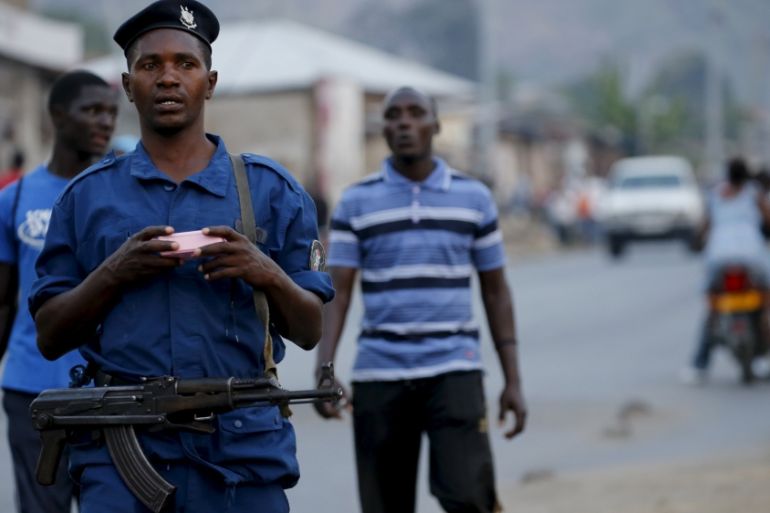Dozens killed in streets of Burundi capital
Up to 40 bodies seen on the streets of capital Bujumbura, witnesses say, a day after attack on army sites.

Dozens of bodies were seen on the streets of the Burundian capital Bujumbura, witnesses told Al Jazeera, after the worst outbreak of violence since a failed coup in May.
Blasts and gunfire echoed around Bujumbura for most of Friday after unknown gunmen attacked three military sites, but there was no fighting overnight and witnesses said the capital’s streets were calm on Saturday morning.
The clashes come amid fears that the central African nation could slide back into ethnic conflict.
Al Jazeera’s Malcolm Webb, reporting from Kampala in Uganda, said witnesses told him that most of the victims were shot dead at close range.
“Some of them were left on the streets, other in gutters. Most of them are young men.
“It is not known who did this, but one witness told me people are suspecting the presidential guard of the killings. They reportedly did this in response to the attacks yesterday,” Webb said.
The witnesses said there may be as many as 40 bodies lying in the streets of Bujumbura.
Unrest in Burundi, which started in April when President Pierre Nkurunziza announced plans for a third term in office, has also unnerved a region that remains volatile two decades after the genocide in neighbouring Rwanda.
A senior police official in the flashpoint Nyakabiga district said there were 20 young men killed in the neighbourhood, and a witness saw at least 16 bullet-ridden bodies in the same area, Reuters news agency reported.
INSIDE STORY: Is Burundi on the brink of civil war?
Residents said some of the dead had been rounded up by the police during the day after house-to-house searches on Friday, an allegation the police denied.
“They entered in our compounds, gathered all young and middle aged men, took them and killed them away from their homes,” said one resident in Nyakabiga.
But police spokesman Pierre Nkurikiye said there were “no collateral victims” during Friday clashes.
“All the deaths were attackers killed in the joint sweep operation of the army and police,” he said. “The enemy was neutralised.”
A government official said the police were collecting bodies across the capital but it was not clear how many people were killed in other districts where fierce fighting also took place.

Willy Nyamitwe, a presidential advisor, called for Kenya Airways to resume flying to Burundi after the carrier and regional rivals RwandAir and Ethiopian Airlines cancelled flights on Friday.
“Today’s flights in and out Burundi should not be cancelled since the roadblocks are removed. Situation came back to normal,” Nyamitwe said on Twitter, addressing Kenya Airways.
Until now, battle lines in Burundi’s crisis have followed the political divide. But Western powers and neighbouring countries fear prolonged violence could reopen old ethnic rifts.
Burundi’s 12-year civil war, which ended in 2005, pitted rebel groups of the Hutu majority, including one led by Nkurunziza, against what was then an army led by the Tutsi minority. Rwanda has the same ethnic mix.
One of the generals behind the failed coup attempt in May said in July the rebel group still aimed to topple the president and experts have warned that the army, which was restructured after the civil war to include rebel fighters, might fracture.
Alarmed by the violence, the United Nations Security Council met on Friday following a request from France, with UN chief Ban Ki-moon, saying the attacks risked triggering “a further destabilisation of the situation”, according to his spokesman.
US Ambassador to the UN Samantha Power said following the closed-door talks that the Council was ready “to consider additional measures” against powerbrokers in the country who continue to block a political solution to the crisis, a veiled threat at sanctions.
The Council said that sending UN peacekeepers to the nation remained an option, and stressed the need for urgent political dialogue.